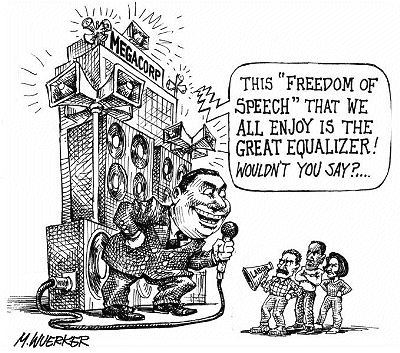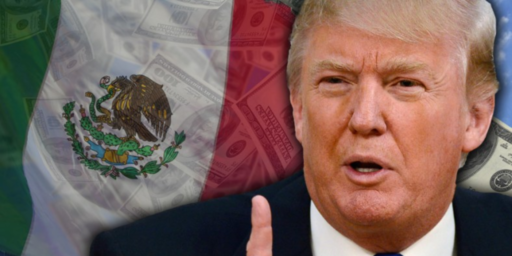Money and Politics
 Negative reactions against yesterday’s Supreme Court ruling throwing out corporate and union spending limits continue to pour in from people who apparently think American politics operate according to the spirit of the various campaign finance laws passed since 1974 rather than, well, the way it actually does.
Negative reactions against yesterday’s Supreme Court ruling throwing out corporate and union spending limits continue to pour in from people who apparently think American politics operate according to the spirit of the various campaign finance laws passed since 1974 rather than, well, the way it actually does.
A NYT editorial (“The Court’s Blow to Democracy“) is typical.
With a single, disastrous 5-to-4 ruling, the Supreme Court has thrust politics back to the robber-baron era of the 19th century. Disingenuously waving the flag of the First Amendment, the court’s conservative majority has paved the way for corporations to use their vast treasuries to overwhelm elections and intimidate elected officials into doing their bidding.
[…]
If a member of Congress tries to stand up to a wealthy special interest, its lobbyists can credibly threaten: We’ll spend whatever it takes to defeat you.
Presumably, the NYT’s editors haven’t paid much attention to the health care debate. Or American politics in general as it’s operated during the entirety of my lifetime.
Members of Congress and wannabe presidents (but I repeat myself) spend most of their waking hours raising money now. Corporations or their various PACs, 527s, and associated trade groups spend tremendous amounts of money on issue ads now. All yesterday’s ruling did is allow them to do it directly rather than through artifice.
I’m reminded of Ross Perot, during his infamous NAFTA debate with Al Gore on “Larry King Live,” arguing that, were the treaty to go into effect, we’d have shanty towns all along the Mexican border doing light manufacturing. To illustrate his case, he produced photographs of the shanty towns all along the Mexican border doing light manufacturing.






Who knew that Roberts, Thomas et al were judicial activists?
I don’t really get your arguments against the NYT and Perot here. Someone says “X is bad now, but if we do Y, X will get worse.” Your zinging reply is to repeat step one of the argument: “X is bad now”. Which for some reason you seem to think is a counterargument.
(In the case of Perot he was explicitly saying that X [the number of Mexican factories along the border] is bad now. In the case of the NYT board, they don’t say that explicitly but I very much doubt that they would disagree with you that corporate money already has a lot of influence.)
In both cases, the structure were/are already there and the change was likely to have no impact.
In the current example, corporations and unions give money through outside agencies. The change would be to cut out the middle man. Which, since the middle man is a fiction, isn’t much of a change.
The only thing I really see changing otherwise is that this spending is easier to continue in the days right before an election. But a narrow ruling on that score would likely have gotten more than 5 votes, since it’s almost prima facie unconstitutional.
Make that “527s” unless you are asserting that all of this is really Nate Silver’s fault. 😉
Do you feel this will increase transparency? From my POV, it seems that blockades are good, whether or not they are 100% effective, just to make these groups have to work harder at bribery. Because that’s all we’re talking about here: it’s bribery, not “free speech”.
😀
Until yesterday, corporations could speak directly on issues. Corporations could also set up PACs which individual shareholders and employees could contribute to, and that PAC could advocate for or against candidates. But up until yesterday, corporations could not use their general revenues to elect or defeat a candidate. Those revenues are far, far greater in magnitude than what PACs could raise before.
This effectively gives the officers and directors of large corporations the ability to use their shareholders’ money in a way they may not be aware of or even agree with in order to determine the outcome of specific elections, changing the makeup of specific Congressional committees, say. (You could argue that corporate governance would limit this practice, but we don’t know for sure yet. It’s a brave new world.)
Worse from the perspective of about half the population, these corporate expenditures will be made overwhelmingly in favor of one party, the GOP, because the CEO class is ideologically conservative. The conservatives on the supreme court have once again put a thumb on the scales to help their party, just as they did in the 2000 election.
An interesting question would be whether state corporate laws could limit the powers of businesses from making expenditures advocating for the election or defeat of any candidate. Since, presumably, each state could abolish their corporate laws and exclude corporations from their borders, I would think they would also have the authority to take this lesser step of limiting the things they may do. However, I don’t put it past the conservatives on the Supreme Court to decide there is a “natural right” to incorporate, since they seem totally results-oriented.
Cowen cited this paper showing that we spend less on politics than we think.
http://www.marginalrevolution.com/marginalrevolution/2010/01/corporations-as-political-donors.html
His conclusion is that the corporate free speech ruling matter less than we think. I think it actually matters more. While corporations can go around current rules, it takes time and must be done legally. IOW, its a pain in the ass. Eliminate that, and corporations will, IMHO, be much more active.
CEOs and corporate boards already have the right of free speech. Now they will have that right and the right to use corporate money. They do this while enjoying the legal protections, the limited personal liabilities of a corporation. They should not have both. Along with the general concentration of wealth into the hands of very few people, this increases political power also.
Steve
Point of emphasis, the law only precluded corporations from engaging in political speech 30 to 60 days before an election. That means at the very least, corporations already could speak on political matters 275 days a year. I agree with Joyner that any immediate changes are unlikely to be observable.
The decision does mean a lot for those who thought these restrictions were too weak and wanted more aggressive restrictions.
What about the effects on state and local government? Let’s review.
State and/or local government
Marries you
Put the myriad stuff here that impinges on your actual day to day life that the feds have nothing to do with
Buries you
I’ll not be surprised if the ruling has its most pernicious effects locally.
Huh? In the Perot example, are you honestly saying that you don’t think a reduction in tariffs and non-tariff barriers would increase imports from Mexico? I guess you’re entitled to your opinion, but that would represent a pretty non-standard view of economics, to put it mildly. If what you meant is you think the increase would be relatively modest, that’s fine, but you need to argue that; you can’t just say hey, we already imported a lot from Mexico. (All this is quite separate from how one feels about NAFTA. I thought at the time and continue to think NAFTA was a good thing, but that’s besides the point.)
As for the campaign finance issue, there are a lot of intricacies and I’m no expert on campaign finance law. Suffice to say that you’re unusual among commentators — on either side of this issue — in saying this is not a big deal and it won’t affect things much.
I’d imagine that corps would have to tread very carefully. There is a longstanding tendency for backlash against monied players in politics.
I actually find this to be less interesting news than say the banks thing.
James does seem to have found a Perot nit in the big globalization picture. A small part of the story, certainly. It probably didn’t play exactly as Perot expected, but that’s not surprising. Few can really predict the future … and Perot has acquired a bit of a squirrelly reputation. On the other hand the US employment picture has certainly changed, and I do know some small businesses (example) that have moved, lock stock and barrel, to Mexico.
BTW, to the extent that this leads to “campaign reform,” my position has been that spending limits have always been futile. There is a dodge for every limit. Better, I think, to simply require honest and public accounting of where all money comes from in all political funding.
Fixed — although Nate probably is involved somehow.
Well, since corporations now enjoy the rights of regular citizens can we assume their stockholders are now civilly liable for the actions of the companies they hold stock in?
Or is this a case of corporate America wanting to have it’s cake and eat it too?
IMO it is another example of a good intention law with bad results. On one hand I don’t like the use of Union dues or Shareholders’ money for political speech but on the other hand believe they should have their say.
The law impeded their free speech. Unions were still able to help politician any many ways including free labor. Many other groups were free to promote or defame candidates. The MSM being an example of major group doing so. Then you have people like Soros and his groups. Why should they have free rein but not other groups?
Uh…no. Corporations are sued as corporations, just as citizens are sued as citizens.
That’s really the whole point of incorporation — to create a permanent entity with its own legal standing. Otherwise, you’ve just got a continually changing business enterprise as high level people come in and out the door.
If CEO Jones leaves ABC Corporation — or, heck, dies — he’s not going to be personally liable for actions that took place under his tenure. Which is a good thing, since he’s got only a fraction of the resources of ABC Corp. But, no matter, ABC Corp remains as a suable entity, which remains just as responsible even though CEO Jones is long gone.
Acorn and the UAW just did a back flip in joy. “Two can play this game,” they said in a joint press release….
Does this mean foreign corporations operating in the USA can now give directly to politicians? How about foreign state owned corps?
So long as they aren’t breaking any laws, why shouldn’t they be allowed to spend money on causes and candidates that support their interest?
There’s no reason that this ruling should change current law on foreign contributions.
I think it’s an absolutely crappy policy, but the right decision constitutionally.
Even ignoring the “corporations are people” aspect, the first amendment prohibits congress from restricting free speech in general, not just the free speech of people.
Did the founding fathers intend this? Probably not. Corporations really weren’t the same things then as they are now — they had much more limited charters.
But we live in the world of unintended consequences — many of us are unintended consequences — and we have to accept that, deal with it as best we can, and work to fix it. I, for one, look forward to the shareholder lawsuits testing how much corporations can give while still maximizing shareholder value.
johnny personna:
I don’t think there’s much likelihood of that. See TPM for how the Chamber of Congress does an end run around disclosure rules.
James Joyner:
Why not? Why can’t foreign individuals, corporations and governments set up US corporations — i.e. US persons with strong First Amendment rights per the Supreme Court ruling — and thereby spend money to influence US politics?
I’d prefer they just voted for their interest (except organizations can’t vote) instead of trying to influence campaigns with loads of cash. After all, in a representative democracy, there’s something inherently unfair with “He who has the most cash has the most influence.”
Does the New York Times have a first amendment right to speech? Or is that just a privilege that Congress has given them by not outlawing media corporations?
I believe the notion that corporations are without rights as artificial persons would create huge holes in our current expectations of privacy, free speech (through corporate-operated media) and government control.
PD Shaw:
The text of the First Amendment is (emphasis added):
So no, PD Shaw, no one disputes that the New York Times (as an example of “the press”) is covered by freedom of speech. The idea that corporations are people is (for better or worse) judge-made law from the 19th Century.
Crust, if you are going to quote the First Amendment, you might note that the restriction is on Congress from abridging speech, not abridging speech of natural persons.
And this is not true: “The idea that corporations are people is (for better or worse) judge-made law from the 19th Century.” The idea originated in English Common law that existed at the time of the Constitution, and there is evidence that the framers of the Fourteenth Amendment had it in mind when they substituted the word “persons” for “citizens,” so former slaves wouldn’t lose their rights when organizing in corporate form. Prof. Bainbridge
But as to the main thrust, I am completely uncomfortable with the notion that there is enshrined somewhere in the Constitution the idea of an establishment press that has rights that nobody else has. Or in this case more rights than a not-for-profit corporation that disseminates political views. They look to me like cranks that would have been distributing incendiary pamphlets 200 years ago along with Thomas Paine.
And if I were to say that unions have no first amendment rights to exress their views, unless any public statements are first approved by the President, you don’t see a problem, there?
I guess I don’t see the catastrophe here.
Corporations don’t want to be too clearly involved (implicated?) in partisan politics, I think they’d probably rather to continue to conceal their hands and protect their brands by using front organizations like they do now.
Can you imagine Apple, or Campbells or Delta Airlines or Verizon wanting to be identified as a Democratic or Republican corporation? How would that help their bottom line?
Actually, if Obama is smart he’ll pivot off this to go populist. Mostly populism is pandering stupidity, but he’s tried competent and dispassionate governance and the people seem to want some red meat. If I was him I’d pair this rhetorically with the banks and insurers (as he’s started to do) throw Geithner under the bus, and go all Teddy Roosevelt.
Nice little side point for all the pro-corporate, anti-foreigner Republicans out there: foreigners own stock in and sit on the boards of, many US corporations. So your Supreme Court just gave foreigners a handle to intervene in US domestic politics. That’s right: Roberts just gave the French, the Japanese and the Chinese a very loud and legal voice in domestic US politics.
Crust:
You’re absolutely right. Since there is no mechanism in place (and no practicable mechanism that I can imagine) to delve into the ultimate ownership of a corporation for campaign expenditure purposes, one of the practical effects of this ruling is that foreign nationals will be able to establish U.S. corporations and spend an unlimited amount of money to influence U.S. elections. It won’t just be the U.S. Senator from Exxon, it will be the U.S. Senator from Saudi Arabia.
Here’s a piece on Indian CEO’s of major US corporations.
Some may be US citizens, not sure. But we have Indian, Chinese, Colombian, British, Dutch, French CEO’s — all now empowered to spend millions to defeat your Senator or Congressman or Governor.
Gee, I guess unintended consequences strike even right-wing judicial activists.
Michael, it is still illegal for a foreign national to directly or indirectly contribute money to an election, a campaign or political advertising to influence an election. So, in an extreme case of using a corporation as a front to make the contributions, it’s a crime. And if it happened in any scale, I suspect they would be caught.
The grayer area, where a foreign national simply owns stock in a multinational or sits on the board of directors, . . . that was already true last week, except during the 30-60 day window.
The opinion specifically left open the authority of the government to regulate foreign-sourced contributions, and I suspect there will be laws on corporate governance coming on that and perhaps disclosure to stockholders. The irony might be that a tool may have just been handed to Pat Buchanan style populist to go after multinationals.
PD:
Under the law a corp is a person and by virtue of being a US corp is for political purposes a US citizen.
A Saudi, an Israeli, a Russian, or a Chinese could form a corp which would then have a separate right to bankroll attack ads. You could surely stop the individual CEO from contributing, but how would you stop the US corp?